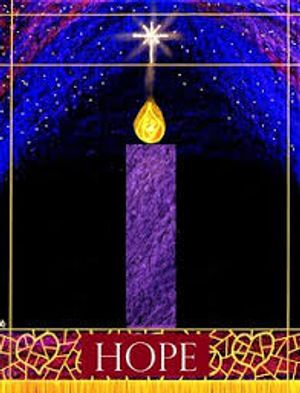Franciscan Fractal
Contemplating Today’s Culture through the Eyes of St. Francis & the Life of Christ
“Advent’s Promise”
“O house of Jacob, come,
let us walk in the light of the Lord!”
Isaiah 2:4
The beginning of Advent is a time for silence, reflection, and insights gleaned from the past. Advent allows us a time for contemplation and repentance. It affords an opportunity to join our unfilled longings, profound losses, and our despair into a solemn prayer as we light the first candle of the Advent Wreath called “Hope.”
As we stumble into Advent this year, I am aware of a multitude of deaths that have recently affected my life. I have seen death often in my career, as a physician and as a pastor. And, I still never completely get over each death. I simply grieve anew each time I remember someone’s face, their laughter, their mannerisms, and especially their human frailties. Writing helps me cope with the many tears that I have attached to their deaths. Advent allows me a place to remember and face those initial feelings of hopelessness and loss once they concluded their earthly journeys.
My introduction to “shakiness” around death was many years ago when I was called to University Hospital in Ann Arbor to counsel a family. In the emergency room, I held the body of a two-and-a-half-year-old boy who had died of a seizure a short time before I arrived. He was the only child of loving parents, who had worked so long to conceive a baby.
When I arrived, the intravenous tubes were still connected. He had a little breathing tube in place that was devoid of any sound of air traversing the pathway into his lungs. What was remarkable was he looked as though he had not yet awakened from his morning nap. Though his eyes were closed, the large dark eyelashes still held their curl. His cheeks were full as though he might still laugh; and his fingers were outstretched as though someone would be there to receive his grasp.
The father sobbed uncontrollably, and turned around frequently, as though he could not bear to face the reality of the moment. He kept blaming himself for having to go to work that morning, and believed that he should have spent more time with his son. His mother just kept kissing her boy gently on the forehead and anointing him again, and again, with her tears. We were to bury him later that week.
Early in my adult life, I believed there could be a reason for evil and death, in and of itself. Evil and death could exist to pave the way for good. God had a plan and if I followed God’s will, I would discover that plan. Now that I am older, I see the folly of this thinking. Evil is evil, and death is death. No good may necessarily be attributed to either.
There was no way to say to this grieving mother or father, “Let’s look and see if we can discover God’s plan in this.” What I am clear about is that God had nothing to do with this boy’s death, nor was there any plan of God in, under, or around his death. Death is everything that God is not. It is real, it hurts, and it exposes our awful loneliness that we feel in being alive. To be alive is to have all of our feelings, and at times like this, it is to have sorrow – sorrow that is so deep and extreme that we ourselves feel as though we cannot breathe.
In my arrogance, I thought that I could know God’s mind. Yet, I eventually realized that I can’t begin to fathom a God who can create an entire universe that is billions of light years across, much less embrace the concepts of death and life. Trying to figure out God’s ways only keeps me in my head and out of my heart. Tears don’t flow easily when I have a head full of ideas. Figuring things out keeps me from feeling the profound presence of God. When I can’t figure things out, I get angry, and cry out, and show my fist to God. And, mercifully, it’s just at these times that God quietly comes to me, embraces me, and gives me hope – the same hope that is announced in Advent.
Only faith can accept a promise – a promise of hope from God — not a head full of ideas about what might be God’s will or plan. There is no plan in a little boy’s death. There is only God’s ability to transform this loss in God’s time into the promise of resurrection in Christ. Meanwhile, we can also take assurance in God’s ability to transform the evil and death that was not of God’s making for good.
And, this is what Advent is about. Advent is a time of waiting. It is a time of anticipation and preparation of our hearts. We wait with hope in the promise that everything that we long for, or miss, or regret, or grieve will be and is made new in Christ.
As I long for God’s comfort, I am reassured by the embrace of hope that Christ offers in this Season of Advent.
Prayers and Blessings,
Fr. John


